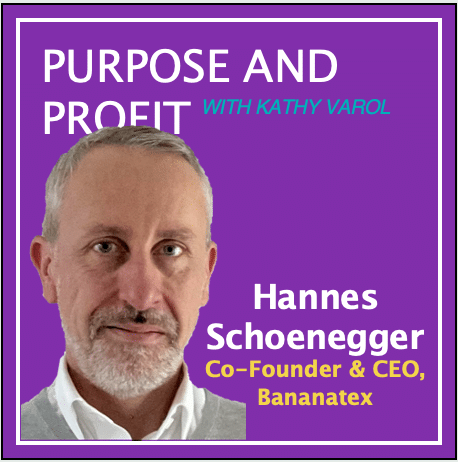Show Notes:
Hannes Schoenegger is the co-founder and CEO of Swiss bag brand QWSTION and its spin-off company Bananatex®. QWSTION has been making bags from plants since 2008, combining functionality and timeless design with the smallest ecological footprint and biggest social footprint possible. Their efforts have been honored with several international awards for outstanding material development and sustainability solutions. Bananatex® is a Cradle to Cradle Gold Certified® material.
In this episode we discuss:
✅ Why recycling won’t solve the global plastic pollution problem
✅ Understanding the full cost of materials
✅ The importance of questioning the status quo
3 episode takeaways (listen to the full episode for a lot more gems!):
1️⃣ Beyond Recycling: Addressing global plastic pollution requires more than just recycling. While recycling plays a role, it’s not a complete solution.
First, not all plastics can be recycled, and those that can degrade with each recycling cycle, limiting future usability. Plastic’s diverse chemical composition also complicates the recycling process by making effective sorting challenging when compared to materials like glass and aluminum. Moreover, the recycling process itself can increase toxicity and release harmful microplastics into the environment.
***
2️⃣ Equitable Waste Management: It’s interesting to think about how to spread the cost of our waste problem across all stakeholders. While regulations target corporations’ environmental impact, what would happen if we increased consumer responsibility? Could a shift toward consumer accountability for end-of-use disposal accelerate demand for sustainable alternatives, prompting companies to adopt more eco-friendly practices?
* * *
3️⃣ Navigating Sustainability’s Complexity: Sustainability is complex because you’re dealing with natural ecosystems and business systems, and sometimes there aren’t clear ways to value costs and benefits. We don’t always know all the implications of a process or decision.
But what we can do is make the best decisions available to us given the information we know now. For example, we know plastic can be a huge problem, and therefore we need to start innovating alternative solutions across the board.
References:
- Connect with Hannes on LinkedIn
- Bananatex®
- A Textile (R)evolution, a short film on Bananatex®
- QWSTION
- The National Law Review primer on New York State’s “Fashion Act”

